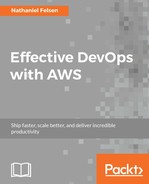Measure everything is the last major principle that DevOps-driven companies adopt. As W. Edwards Deming said: "If you can't measure it, you can't manage it" DevOps is an ever-evolving process that feeds off those metrics to assess and improve the overall quality of the product and the team working on it.
From a tooling and operating standpoint, here are some of the metrics most organizations look at:
- Check how many builds a day are pushed to production.
- Check how often you need to roll back production in your production environment (this is indicated when your testing hasn't caught an important issue).
- The percentage of code coverage.
- Frequency of alerts resulting in paging the on-call engineers for immediate attention.
- Frequency of outages.
- Application performance.
- Mean time to resolution (MTTR), which is the speed at which an outage or a performance issue can be fixed.
At the organizational level, it is also interesting to measure the impact of shifting to a DevOps culture. While it is a lot harder to measure, you can consider the following points:
- The amount of collaboration across teams
- Team autonomy
- Cross-functional work and team efforts
- Fluidity in the product
- Happiness among engineers
- Attitude toward automation
- Obsession with metrics
As you just saw, having a DevOps culture means, first of all, changing the traditional mindset that developers and operations are two separate silos and make both teams collaborate more during all phases of the software development life cycle.
In addition to a new mindset, DevOps culture requires a specific set of tools geared toward automation, deployment, and monitoring:

Amazon with AWS offers a number of services of the PaaS and SaaS types that will let us do just that.
